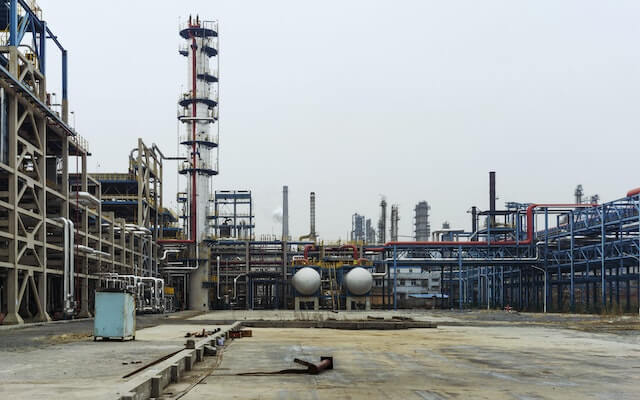Top companies in the integrated oil companies industry are Exxon Mobil, Chevron, Royal Dutch Shell PLC and China Petroleum Chemical Corp. More so, these companies are the biggest employers of labor worldwide. Valued at nearly $400 billion, the integrated oil companies contribute significantly to the economy worldwide.
Overview of the Integrated Oil Companies Field
To say that the integrated oil companies sector is huge is an understatement. At nearly $400 billion, the oil industry accounts for 3.8% of the global economy.
Integrated oil companies in the United States generate little more than $180 billion in sales each year and employ 9.8 million people. This accounts for 5.6% of all U.S. employment.
Currently, the integrated oil companies sector industry is expected to be worth $6.819 trillion in 2023. This is not least surprising as the industry produces about 6.8 billion barrels of oil yearly.
Types of Integrated Oil Companies
Integrated oil companies are big corporations involved in the exploration, production, refining, marketing, and distribution of oil.
Here are 5 common types of integrated oil companies:
1. Major integrated oil companies
ExxonMobil, Chevron, and BP are some of the largest and most well-known integrated oil companies. They often have a global footprint and operate in many geographical locations.
2. National oil companies (NOCs)
These are government-owned corporations that operate in a certain nation or region. Examples are Saudi Aramco, Petronas, and Gazprom.
3. Independent oil companies
These are smaller oil firms that specialize in exploration and production as well as refining and marketing.
4. Supermajors
These are the largest integrated oil corporations in the world, with a market valuation in excess of $100 billion. ExxonMobil, Chevron, BP, Royal Dutch Shell, and Total are the five largest integrated oil companies in the world.
5. Oilfield services companies
These are companies that specialize in oil and gas sector services such as drilling, well completion, and reservoir study.
Top 20 Integrated Oil Companies
As stated above, integrated oil companies contribute significantly to the world’s economy by providing numerous jobs.
Here are the top 20 integrated oil companies worldwide:
1. Exxon Mobil

Size: 73,000 employees
Market Capitalization: $352 billion
Headquarters: Irving, Texas
CEO: Darren W. Woods
Exxon Mobil is involved in practically every aspect of the oil and gas sector, including petroleum product discovery, production, transportation, and sale. In 1999, two of Standard Oil’s offspring, Exxon and Mobil, merged to establish the corporation.
Exxon Mobil generates more than 3% of the world’s oil supply and 2% of total energy through four major business segments. These segments are upstream, midstream, downstream, and chemicals.
Exxon Mobil is now investing heavily in a new sustainable energy business area that will manufacture algal biofuels, carbonate fuel cells, and biodiesel. These initiatives, however, are in their early phases, and the business does not anticipate commercializing them until the 2030s.
2. Chevron
Size: 48,000 employees
Market Capitalization: $215 billion
Headquarters: San Ramon, California
CEO: Michael K. Wirth
Chevron is a worldwide energy business involved in many aspects of the oil and gas sector, including exploration, refining, marketing, and distribution.
The company operates in over 180 countries. However, it is primarily focused on the west coast of the United States, Southeast Asia, and the United States Gulf Coast.
Chevron produced an average of 823,000 barrels of oil per day in the United States alone in 2019. They also produce a variety of petroleum derivatives, such as lubricants and additives. The firm operates about 11,000 oil and natural gas wells in the Permian Basin, making it the region’s fourth-largest producer.
3. Royal Dutch Shell PLC
Size: 87,000 employees
Market Capitalization: $224 billion
Headquarters: London, U.K.
CEO: Ben van Beurden
Royal Dutch Shell PLC is headquartered in the United Kingdom and, via its various subsidiary firms, produces, refines, and explores petroleum.
The Royal Dutch Petroleum Company, located in the Netherlands, amalgamated with the British business “Shell” Transport and Trading Company in 1907.
Aside from operating over 44,000 service stations around the world, the company also manufactures and sells lubricants, fuels, and other petrochemicals.
4. Total SE
Size: 107,000 employees
Market Capitalization: $129 billion
Headquarters: Paris, France
CEO: Patrick Pouyanné
Total SE, headquartered in France, discovers and produces natural gas, crude oil, and low-carbon power for global distribution.
Petrochemical items such as lubricants, chemical fertilizers, and synthetic rubbers are also manufactured and refined by the corporation.
Total SE has over 550 gas stations in North America and over 1,200 in Europe and Africa.
5. China Petroleum Chemical Corp (Sinopec)

Size: 358,000 employees
Market Capitalization: $109 billion
Headquarters: Beijing, China
CEO: Zhang Yuzhuo
China Petroleum Chemical Corp, also known as Sinopec, is a company that explores and refines oil and natural gas. The company also manufactures and distributes petroleum and petrochemical goods.
The primary products of the corporation are gasoline, kerosene, and diesel. In addition, they sell adhesive resins, jet fuel, and synthetic rubber.
Sinopec produces more than 60% more refined petroleum products per year. The corporation holds significant investments in major oil and gas companies all around the world. This includes a 33% stake in Egypt’s Apache Corporation.
6. Phillips 66
Size: 14,000 employees
Market Capitalization: $61 billion
Headquarters: Houston, Texas
CEO: Greg Garland
Phillips 66 became a standalone corporation in 2012 after ConocoPhillips broke off its midstream and downstream assets. The principal products of the firm are various petrochemicals and natural gas liquids, which it sells in 65 countries.
Phillips 66, in addition to owning one-fourth of the Dakota Access Pipeline, also controls 13 crude oil refineries and a 50% interest in Chevron Phillips Chemical Co. Every day, the company’s companies produce around 2.2 million barrels of oil.
Phillips 66 primarily operates in the Southwest and Midwest of the United States. However, through a licensing agreement with Motiva Enterprises in 2016, the company has been gradually expanding into the New York City metro region.
7. Saudi Aramco
Size: 76,000 employees
Market Capitalization: $2.2 trillion
Headquarters: Dharan, Saudi Arabia
CEO: Amin H. Nasser
Saudi Aramco went public in 2019 and immediately became the world’s largest integrated oil company by market capitalization.
Saudi Aramco’s primary businesses are crude oil production and processing. It also participates in many other parts of the petroleum business, such as the production of petrochemicals and other oil derivatives.
With 270 billion barrels of proven crude oil reserves, the business ranks second in the world. It also refines the most oil of any firm at a pace of 5.4 million barrels per day.
8. BP
Size: 70,000 employees
Market Capitalization: $87 billion
Headquarters: London, United Kingdom
CEO: Bernard Looney
BP is the biggest oil firm in the United Kingdom. This company is engaged in the exploration, production, and distribution of a wide range of oil and petrochemical products.
Chemicals such as ethylene, polyethylene, and terephthalic acid are among the company’s principal petroleum products.
BP also generates and sells solar energy, which they are substantially investing in and increasing.
9. PetroChina Co.Ltd.
Size: 464,000 employees
Market Capitalization: $175 billion
Headquarters: Beijing, China
CEO: Ling Xiao
PetroChina is one of the world’s major oil and gas producers. The primary products of the corporation are crude oil, oil derivatives, and different petrochemical items. PetroChina conducts petroleum exploration in addition to the development and manufacturing of oil products.
The company discovered approximately 358 billion tons of oil in the Ordos Basin in 2019. PetroChina found 740,971 million cubic meters of shale gas in the Sichuan Basin later that year.
PetroChina is essentially the exchange-listed subsidiary of China National Petroleum Corporation. A significantly larger Chinese state-owned oil corporation.
10. Gazprom

Size: 462,000 employees
Market Capitalization: $85.2 billion
Headquarters: Moscow, Russia
CEO: Alexey Miller
With a 17% worldwide share of gas reserves, Gazprom has the world’s biggest network of gas trunklines.
Despite being a private company, the Russian government owns the vast majority of its shares. Gazprom now accounts for around 14% of world gas output and 74% of Russian gas output.
Gazprom has recently concentrated on large-scale projects to exploit gas resources in the Yamal Peninsula, Arctic Shelf, and Eastern Siberia. The company has also expanded into Russia’s Arctic shelf resources and is currently constructing a gas connection to China.
11. LUKOIL
Size: 107,000 employees
Market Capitalization: $60.6 billion
Headquarters: Moscow, Russia
CEO: Vagit Alekperov
LUKOIL is one of the world’s largest publicly listed, vertically integrated oil and gas enterprises. The company accounts for more than 2% of global oil output and around 1% of proven hydrocarbon reserves.
Through the supply of its products, power, and heat, LUKOIL serves millions of consumers in over 100 countries around the world. The company employs over 100,000 professionals.
LUKOIL has a significant international presence and operates in more than 30 countries around the world. Its international operations include exploration and production activities in countries such as Iraq, Uzbekistan, Egypt, and Mexico.
12. Wood PLC
Size: 50,000 employees
Market Capitalization: $6.7 billion
Headquarters: Aberdeen, United Kingdom
CEO: Robin Watson
Wood Group is an oil and gas services multinational located in Aberdeen, Scotland.
Wood offers performance-driven solutions from concept to decommissioning in a wide range of industrial markets.
Wood Group has a significant international presence, operating in more than 60 countries around the world. Its international operations include providing engineering and project management services to the oil and gas industry in the Middle East, Africa, and Asia-Pacific.
13. National Iranian Oil Company
Size: 50,000 employees
Market Capitalization: N/A
Headquarters: Tehran, Iran
CEO: Masoud Karbasian
National Iranian Oil Company is a government-owned organization overseen by Iran’s Ministry of Petroleum.
The company is a national oil and natural gas producer and distributor based in Tehran. It was founded in 1948 and strengthened by The Consortium Agreement in 1954.
National Iranian Oil Company has a significant presence internationally and operates in several countries through subsidiaries and joint ventures. Its international operations include the exploration and production of oil and gas in countries such as Iraq, Venezuela, and Azerbaijan.
14. Marathon Petroleum
Size: 40,000 employees
Market Capitalization: $42 billion
Headquarters: Findlay, Ohio
CEO: Michael J. Hennigan
Marathon petroleum products are refined, transported, supplied, and sold all over the world. The majority of the company’s operations are in the United States, where it owns or leases hundreds of miles of petroleum pipeline.
Marathon also controlled Speedway until August 2020, when it sold the firm and its 4,000 petrol stations to Japanese retail conglomerate Seven & I Holdings.
The company has operations in several countries, including the United Kingdom, Norway, and Canada.
15. Halliburton

Size: 40,000 employees
Market Capitalization: $21.2 billion
Headquarters: Houston, United States
CEO: Jeff Miller
Halliburton provides a comprehensive range of oilfield services and products to upstream oil and gas clients across the world. Halliburton, founded in 1919, is one of the world’s major producers of energy-related goods and services.
The company serves the upstream oil and gas industry throughout the reservoir lifecycle. This ranges from locating hydrocarbons and managing geological data to drilling and formation evaluation.
The company currently has over 50,000 employees representing 140 nationalities and operations in approximately 70 countries.
16. Eni
Size: 31,000 employees
Market Capitalization: $54.4 billion
Headquarters: Rome, Italy
CEO: Claudio Descalzi
Eni S.p.A. is a multinational Italian oil and gas business based in Rome. The company specializes in the exploration, production, refining, and marketing of oil and gas.
As of August 14, 2013, it was ranked as the world’s 11th largest industrial corporation, with a market valuation of 68 billion euros.
The company’s international operations include exploration and production activities in countries such as Egypt, Algeria, Angola, Nigeria, and the United States. The company also has refining and marketing operations in several countries across Europe, Asia, and the Americas.
17. Equinor ASA.
Size: 21,000 employees
Market Capitalization: $80.9 billion
Headquarters: Stavanger, Norway
CEO: Anders Opedal
Equinor ASA is a worldwide energy business controlled by the Norwegian government. Although the company’s primary operations are the exploration, refinement, and distribution of petroleum and petroleum derivatives, it also manages a growing renewable energy segment.
The firm was founded in 2007 as a result of a combination between Norsk Hydro’s oil and gas division and Statoil. The general public owns 33% of the corporation, with the government controlling the remaining 67%.
Equinor is the largest oil exploration company on the Norwegian continental shelf, accounting for 60% of total output. It also owns and operates oil and gas fields in key nations such as Canada, Brazil, and the United States.
18. Valero Energy
Size: 10,000 employees
Market Capitalization: $28 billion
Headquarters: San Antonio, Texas
CEO: Joe Gorder
Valero is a company that manufactures, produces, and sells transportation fuels and other petrochemical products.
The corporation owns and operates 15 refineries in the United States and Canada, as well as one in Wales. Each of them produces an average of 3 million barrels of oil each day.
Valero also owns and runs 11 ethanol facilities that produce 1.2 billion gallons of ethanol per year, as well as a 50-megawatt wind farm. Valero also earns hundreds of millions of dollars each year through defense contracts with the United States Defense Logistics Agency Energy (DLA Energy).
19. Kuwait Petroleum Corporation (KPC)
Size: 7,000 employees
Market Capitalization: N/A
Headquarters: Safat, Kuwait
CEO: Hashem Sayed Hashem
Kuwait Petroleum Corporation, located in Kuwait City, is the country’s main oil firm. Kuwait Petroleum Corporation’s operations include petroleum exploration, production, petrochemicals, refining, marketing, and transportation.
KPC accounts for approximately 7% of global crude oil production. KPC has a significant presence in the global energy market.
Its international operations include exploration and production activities in countries such as Canada, Australia, Indonesia, and Pakistan. In addition, KPC also engages in the trading and marketing of crude oil and refined products in international markets.
20. Occidental Petroleum Corporation

Size: 11,000 employees
Market Capitalization: $46.2 billion
Headquarters: Houston, Texas
CEO: Vicki Hollub
Occidental Petroleum Corporation (Oxy) is a worldwide oil and gas exploration and production business headquartered in Houston, Texas. The corporation was formed in California in 1920 and has evolved to become one of the world’s major oil and gas companies, having activities in the United States, the Middle East, and Latin America.
Oxy’s operations are largely centered on crude oil and natural gas exploration, development, and production.
Onshore and offshore oil and gas resources, as well as pipelines and other infrastructure, are part of the company’s portfolio. Oxy operates chemical manufacturing and midstream industries in addition to oil and gas exploration and production.
Table showing the top 20 companies in the Integrated Oil Companies field
| Company | No. of Employees | Headquarters | Market Capitalization |
| Exxon Mobil | 73,000 | Irving, Texas
| $352 billion
|
| Chevron | 48,000 | San Ramon, California | $215 billion |
| Royal Dutch Shell PLC
| 87,000 | London, U.K.
| $224 billion
|
| Total SE | 107,000 | Paris, France
| $129 billion
|
| China Petroleum Chemical Corp. | 358,000 | Beijing, China
| $109 billion
|
| Phillips 66 | 14,000 | Houston, Texas | $61 billion
|
| Aramco | 76,000 | Dharan, Saudi Arabia
| $2.2 trillion
|
| BP
| 70,000 | London, United Kingdom | $87 billion
|
| PetroChina Co. Ltd. | 464,000 | Beijing, China
| $175 billion
|
| Gazprom | 462,000 | Moscow, Russia
| $85.2 billion
|
| LUKOIL | 107,000 | Moscow, Russia
| $60.6 billion |
| Wood PLC | 50,000 | Aberdeen United Kingdom | $6.7 billion
|
| National Iranian Oil Company | 50,000 | Tehran, Iran | N/A |
| Marathon Petroleum
| 40,000 | Findlay, Ohio | $42 billion
|
| Halliburton | 40,000 | Houston, United States | $21.2 billion
|
| Eni | 31,000 | Rome, Italy | $54.4 billion |
| Equinor ASA | 21,000 | Stavanger, Norway | $80.9 billion
|
| Valero Energy | 10,000 | San Antonio, Texas | $28 billion
|
| Kuwait Petroleum Corporation (KPC) | 7,000 | Safat, Kuwait | N/A |
| Occidental Petroleum Corporation | 11,000 | Houston, Texas | $46.2 billion |
Commonalities of the Integrated Oil Companies Industry
Despite the diversity of integrated oil companies, the industry is defined by several commonalities.
Here are 5 major commonalities of integrated oil companies:
1. Vertical integration
Integrated oil companies are involved in all parts of the oil and gas sector, from exploration to refining and marketing. This gives them complete control over the supply chain and allows them to optimize earnings.
2. Large-scale operations
Integrated oil companies are often huge, multinational organizations with a global footprint. This enables businesses to take advantage of economies of scale and invest extensively in R&D.
3. High capital expenditure
To sustain and increase operations, the oil and gas business requires an enormous investment in infrastructure, technology, and exploration. To remain competitive, integrated oil companies spend extensively in these areas.
4. Heavy regulation
The oil and gas business is heavily regulated, with firms required to meet severe safety, environmental, and operational criteria. Integrated oil companies are under intense scrutiny from authorities and the general public.
5. Market volatility
Due to supply and demand variables, geopolitical tensions, and other market dynamics, the oil and gas business experiences large price changes. To retain profitability and remain competitive, integrated oil companies must control volatility.
How to Get a Job Offer from Companies in the Integrated Oil Companies?
Obtaining a job offer from integrated oil companies can be a competitive and difficult process.
Here are 5 practical ways to get a job offer from integrated oil companies:
1. Find relevant job openings
First, start by researching integrated oil companies that interest you. Visit the career pages of these companies to find openings that match your abilities and expertise.
2. Customize your resume and cover letters
Make your resume and cover letter relevant to the position you’re looking for by emphasizing your relevant experience, abilities, and credentials. To make your application stand out, include keywords from the job description.
3. Network
Reach out to people in your network who work in the oil and gas industry, such as university alumni, former colleagues, and industry associations. Meet new people and learn about career chances by attending industry events and conferences.
4. Prepare for interviews
If you are invited to an interview, study the organization, read the job description, and practice replies to common interview questions. Prepare to go through your experience, talents, and certifications in depth.
5. Emphasize relevant experience
Highlight any relevant experience you have in the oil and gas industry or a related field such as engineering, geology, or environmental science. Highlight any relevant software experience, technical skills, or certifications.
6. Be adaptable
Be willing to relocate, work in distant places, or take a position that may not be your dream career. This may serve as a stepping stone to your preferred position.
7. Follow up
After submitting an application or attending an interview, contact the hiring manager or recruiter to convey your ongoing interest in the position. Also, use the opportunity to inquire about the next stages in the recruiting process.
What Companies in the Integrated Oil Companies Field Look For When Hiring?
Typically, integrated oil companies seek people with a mix of technical expertise, industry experience, and soft skills.
Here are 5 major traits integrated oil companies look for when hiring:
1. Technical skills
Firms in the integrated oil companies industry want people with a solid technical background in subjects such as engineering, geology, or environmental science. They also want applicants who have prior expertise with appropriate software, tools, and technologies.
2. Industry Knowledge
Integrated oil companies need people with a thorough grasp of the oil and gas industry, including trends, problems, and regulatory requirements. They also look for applicants who have worked in the sector or in disciplines linked to it.
3. Soft skills
Integrated oil companies value candidates with good communication, cooperation, and problem-solving abilities. They also want applicants who can work well in groups, handle many priorities, and adapt to changing settings.
4. Safety focus
Safety is a significant responsibility in the oil and gas business. Thus, integrated oil companies want people that emphasize safety in their work and are dedicated to adhering to safety regulations.
5. Adaptability
The oil and gas business is volatile and evolving. Thus, integrated oil companies need applicants who can adjust to changing situations, think creatively, and solve difficult challenges.
Conclusion: World’s Top 20 Integrated Oil Companies
Integrated oil companies have built a name for themselves in the unpredictable oil market, generating billions of dollars in revenue. These companies are engaged in various activities spanning one or more of the upstream, midstream, and downstream areas.
FAQs: World’s Top 20 Integrated Oil Companies
What are the largest integrated oil companies known as?
The largest integrated oil companies are commonly known as “supermajors.” Supermajors refer to the five largest integrated oil companies, which are BP, Chevron, ExxonMobil, Royal Dutch Shell, and Total.
What are integrated oil companies?
Integrated oil companies are big corporations involved in the refining, shipping, and marketing of oil.
What are the 5 big oil companies?
The Big 5 oil companies are BP, Chevron, ExxonMobil, Royal Dutch Shell, and Total.
Who is the largest oil-producing company in the world?
Saudi Aramco is the largest oil-producing company in the world. Saudi Arabia’s state-owned oil company reported a crude oil output of some 9.2 million barrels per day.








